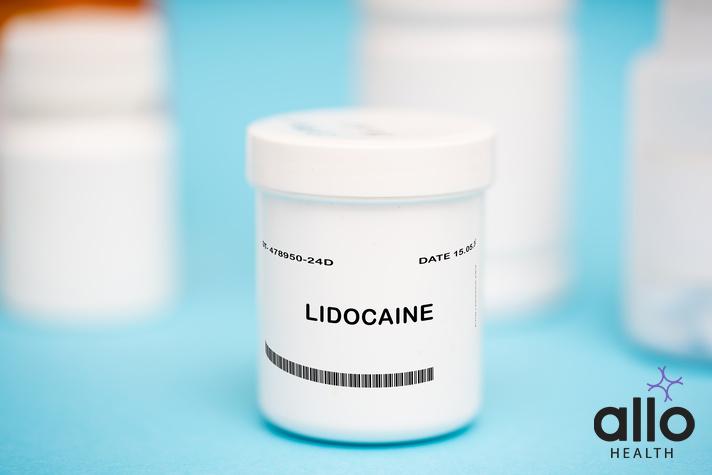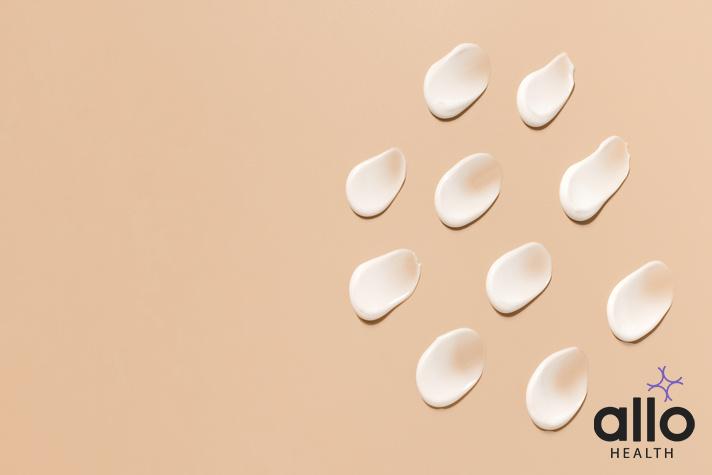Can I Use Lidocaine for Erectile Dysfunction?

Allo Health is dedicated to personalized well-being, offering support and trusted information tailored to individual health goals. The platform emphasizes human-generated content, led by a distinguished medical team of experts, including physicians and sexual health specialists. Their commitment to credibility involves rigorous fact-checking, authoritative research, and continuous updates to ensure accurate, up-to-date information. Allo Health's unique approach goes beyond conventional platforms, providing expert-led insights and a continuous commitment to excellence, with user feedback playing a crucial role in shaping the platform's authoritative voice.

Dr Sanina Mansoor holds MBBS degree from Yenepoya university,Mangalore.She has 8 years of experience working as a medical officer at various health centres and medical colleges.
Why This Was Upated?
Our experts continually monitor the health and wellness space, and we update our articles when new information became available.
Updated on 23 May, 2024
- Article was updated as part of our commitment to diversity, equity, and inclusion.

"The following blog article may discuss medical treatments and interventions. However, it is important to note that the information provided is for general educational purposes only and should not be considered as a substitute for professional medical advice, diagnosis, or treatment. Always seek the guidance of a qualified healthcare professional for personalized medical advice.
Book consultation
Medical treatments are complex and should be tailored to individual circumstances. The information presented in this blog may not be applicable to everyone, as each person's medical condition, history, and needs are unique. Only a qualified healthcare professional can evaluate your specific medical situation, consider relevant factors, and provide appropriate recommendations for diagnosis, treatment options, and monitoring.
It is crucial to note that self-diagnosis, self-medication, or relying solely on the information provided in this blog for treatment decisions can have serious health consequences. "
Lidocaine is a topical anaesthetic known for its potential benefits in addressing premature ejaculation (PE). While it is not intended or approved for the treatment of erectile dysfunction (ED), lidocaine has shown promise in increasing ejaculatory control and improving sexual satisfaction for individuals struggling with PE.
In this article, we will explore the role of lidocaine in managing premature ejaculation, its effects, treatment options, and the scientific evidence supporting its efficacy.
Understanding Premature Ejaculation
- Premature ejaculation is a common sexual dysfunction that affects a significant number of men worldwide.
- It is characterised by the inability to delay ejaculation, leading to dissatisfaction and distress in sexual encounters.
- Premature ejaculation can have various causes, including psychological factors, such as performance anxiety or relationship issues, as well as physiological factors like hormonal imbalances or heightened penile sensitivity.
- Men experiencing premature ejaculation often find it challenging to maintain control over their ejaculation, resulting in shorter-than-desired sexual encounters. This can lead to frustration, embarrassment, and a negative impact on overall sexual satisfaction.
- Understanding the causes and mechanisms behind premature ejaculation is essential in finding effective solutions to address this condition.
- Psychological factors play a significant role in premature ejaculation. Performance anxiety, stress, and pressure to perform can all contribute to the inability to delay ejaculation. Relationship issues, unresolved conflicts, or lack of emotional intimacy may also contribute to premature ejaculation in some cases. Addressing these psychological aspects through counselling or therapy can be beneficial in managing and overcoming premature ejaculation.
- Physiological factors can also contribute to the development of premature ejaculation. Hormonal imbalances, abnormal levels of neurotransmitters in the brain, or an oversensitivity of the penile nerves can all affect ejaculatory control. In some instances, certain medical conditions or medications may contribute to premature ejaculation. Consulting with a healthcare professional can help identify and address any underlying physiological factors that may be contributing to the condition.
Understanding Erectile Dysfunction
- Erectile dysfunction (ED) is a condition characterised by the inability to achieve or maintain an erection sufficient for sexual intercourse.
- It is a common common that can affect men of all ages but becomes more prevalent with age.
- There are several factors that can contribute to the development of erectile dysfunction, including physical, psychological, and lifestyle factors.
- Physical causes may include underlying medical conditions such as diabetes, heart disease, obesity, high blood pressure, hormonal imbalances, or neurological disorders. Certain medications and substance abuse can also contribute to ED.
- Psychological factors such as stress, anxiety, depression, relationship problems, or performance anxiety can also lead to erectile dysfunction.
- Sometimes, a combination of physical and psychological factors can be involved in causing the condition.
- The diagnosis of erectile dysfunction typically involves a thorough medical history, physical examination, and possibly additional tests to determine the underlying cause. It’s important to consult with a healthcare professional, such as a urologist or a primary care physician, for an accurate diagnosis and appropriate treatment options.
- Treatment for erectile dysfunction depends on the underlying cause. In some cases, addressing lifestyle factors such as smoking cessation, weight loss, regular exercise, and reducing alcohol consumption may improve erectile function. If there are underlying medical conditions, treating those conditions may help resolve ED.
- There are also several medical interventions available for ED. Oral medications, such as sildenafil (Viagra), tadalafil (Cialis), or vardenafil (Levitra), are commonly prescribed and work by increasing blood flow to the penis.
- Other treatment options include penile injections, vacuum erection devices, urethral suppositories, or in some cases, surgical implants.
- In addition to medical treatments, counselling or therapy may be recommended, especially if psychological factors are contributing to the condition. Couples therapy can also be beneficial in addressing relationship issues that may be impacting sexual function.

Lidocaine: Treatment for Premature Ejaculation
- Lidocaine has emerged as a promising treatment option for individuals struggling with premature ejaculation.
- This topical anesthetic has shown potential in increasing ejaculatory control and improving sexual satisfaction for those experiencing this condition.
- Lidocaine, available in various forms such as creams and sprays, acts as a local anesthetic when applied to the penis.
- It temporarily numbs the nerve endings, reducing sensitivity and delaying ejaculation. By desensitizing the penile region, lidocaine can extend the time before orgasm is reached, allowing individuals to have longer-lasting sexual encounters.
- The mechanism of action behind lidocaine’s effectiveness lies in its ability to inhibit the transmission of nerve signals responsible for triggering ejaculation.
- By reducing penile sensitivity, lidocaine helps individuals maintain better control over their sexual response, ultimately prolonging sexual encounters and enhancing sexual satisfaction.
- Lidocaine should be used as directed and in consultation with a healthcare professional. Proper application and dosage are crucial to achieve optimal results and minimize potential side effects.
- It is recommended to apply lidocaine-based products, such as creams or sprays, a few minutes before sexual activity.
- However, individual response may vary, and consulting a healthcare professional can provide personalized guidance on the usage and suitability of lidocaine for each individual’s specific circumstances.
- While lidocaine has shown promise as a treatment for premature ejaculation, it is important to recognize that it may not be suitable for everyone.
- Allergic reactions or adverse effects can occur, although they are generally rare.
- Testing lidocaine products on a small area of the skin before full application is advised to ensure compatibility and avoid any potential adverse reactions.
Can Lidocaine Be Used for Treatment of Erectile Dysfunction?
- Lidocaine is primarily used as a local anesthetic to numb a specific area of the body.
- It is commonly used in medical procedures, dental work, and as a topical cream or gel for minor skin irritations.
- While lidocaine may have some numbing effects that could potentially help with erectile dysfunction (ED) by reducing sensitivity, it is not a recommended or approved treatment for ED.
- Erectile dysfunction is typically caused by underlying medical conditions such as cardiovascular disease, diabetes, hormonal imbalances, or psychological factors.
- If you are experiencing erectile dysfunction, it is important to consult with a healthcare professional who can evaluate your specific situation and provide appropriate guidance and treatment options.
- They can help identify the underlying cause of your ED and recommend evidence-based treatments that are proven to be effective and safe.
Treatment Options for Erectile Dysfunction
Lifestyle Changes
- Healthy Diet: A balanced diet rich in fruits, vegetables, whole grains, and lean proteins can contribute to overall sexual health.
- Regular Exercise: Physical activity can improve blood flow, which is crucial for erectile function.
- Weight Management: Maintaining a healthy weight can help reduce the risk of ED.
Medications
- Oral Medications: Drugs like sildenafil (Viagra), tadalafil (Cialis), and vardenafil (Levitra) are commonly prescribed to enhance blood flow to the penis.
- Testosterone Replacement Therapy: For individuals with low testosterone levels, hormone replacement therapy may be considered.
Vacuum Devices:
- Penis Pumps: These devices create a vacuum to draw blood into the penis, helping achieve an erection. A constriction ring is then placed at the base to maintain the erection.
Injections:
- Intracavernosal Injections: Medications like alprostadil can be injected directly into the penis, causing an erection.
Penile Implants:
- Inflatable Implants: Surgically implanted devices that can be inflated to create an erection.
- Malleable Implants: Semi-rigid rods are implanted into the penis, allowing it to be bent into a natural position.
Therapy and Counseling:
- Psychotherapy: Addressing psychological factors contributing to ED, such as stress, anxiety, or relationship issues.
- Sexual Counseling: Working with a therapist to improve communication and intimacy.
Safety, Side Effects, and Considerations
While lidocaine-based products can be effective in managing premature ejaculation, it is important to be aware of their safety, potential side effects, and certain considerations associated with their usage.
- Safety: Lidocaine is generally considered safe when used as directed. However, it is crucial to follow the instructions provided by the manufacturer or healthcare professional. Applying excessive amounts of lidocaine or using it more frequently than recommended can increase the risk of adverse effects.
- Potential Side Effects: Like any medication or topical treatment, lidocaine-based products may have potential side effects. Common side effects may include temporary numbness or reduced sensation in the treated area, localized skin reactions such as redness or itching, or a mild burning or stinging sensation. These side effects are usually mild and temporary, resolving on their own.
- Allergies and Sensitivities: Some individuals may be allergic or sensitive to lidocaine or other ingredients present in the product. It is important to check the product’s ingredients and discontinue use immediately if any allergic reactions, such as rash, swelling, or difficulty breathing, occur. If you have a known allergy to lidocaine or local anesthetics, it is advisable to avoid using lidocaine-based products altogether.
- Partner Considerations: When using lidocaine-based products, it is essential to communicate openly with your sexual partner. Your partner should be aware of the numbing effects of lidocaine to ensure that they are comfortable during sexual activity. It may also be beneficial to involve your partner in the application process to ensure appropriate and targeted usage of the product.
- Consultation with Healthcare Professional: Before using lidocaine-based products or any other treatment for premature ejaculation, it is recommended to consult with a healthcare professional. They can assess your specific situation, discuss potential risks and benefits, and provide personalized guidance. This is particularly important if you have any pre-existing medical conditions or are taking other medications that may interact with lidocaine.
- Usage Guidelines: Follow the recommended usage guidelines for lidocaine-based products. Applying too much product or using it for an extended period may lead to excessive numbing, which can interfere with sexual enjoyment. It is important to strike a balance between achieving the desired effect of delayed ejaculation and maintaining adequate sensitivity for sexual pleasure.
- Combination Therapy: Lidocaine-based products can be used in combination with other treatment options for premature ejaculation, such as behavioral techniques or therapy. Combining different approaches may enhance their overall effectiveness and provide a comprehensive solution.

How To Use?
Here is a general guide on how to use lidocaine-based products for premature ejaculation:
- Read the instructions: Start by carefully reading the instructions provided with the form of lidocaine-based product. Each product may have specific guidelines and usage recommendations that you should follow.
- Cleanse the area: Before applying the product, ensure that the genital area is clean and dry. Gently wash with mild soap and water and pat dry.
- Apply a small amount: Take a small amount of the lidocaine-based cream or spray and apply it to the sensitive areas of the penis, such as the glans or the underside of the shaft. Avoid contact with the urethral opening.
- Massage or rub in: Gently massage or rub the numbing product into the skin until it is absorbed. Follow the specific instructions provided with the product regarding the duration of massage or rubbing.
- Allow time for absorption: Give the product enough time to be absorbed into the skin. The recommended duration may vary depending on the specific product, but it is typically a few minutes before sex.
- Assess sensitivity: After the product has been absorbed, assess the level of sensitivity. If you feel that the numbing effect is too strong or you have reduced sensation, you may consider adjusting the amount of product used in subsequent applications.
- Communicate with your partner: It is important to communicate with your sexual partner about the use of lidocaine-based products. Inform them about the numbing effects and involve them in the application process if desired. Their comfort and satisfaction are essential for a positive sexual experience.
- Observe the effects: During sexual activity, pay attention to the level of sensitivity and the impact on ejaculation control. Lidocaine-based products aim to delay ejaculation, allowing for longer-lasting sexual encounters. Adjust the usage amount or technique based on your individual needs and preferences.
- Follow recommended usage guidelines: It is crucial to follow the recommended usage guidelines provided with the product. Avoid using excessive amounts of lidocaine or applying it more frequently than recommended, as it can lead to excessive numbing and reduce sexual pleasure.
Frequently Asked Questions
Q: Are lidocaine-based products safe to use?
A: Lidocaine-based products, when used as directed, are generally considered safe. However, it is important to follow the instructions provided by the manufacturer and consult with a healthcare professional if you have any concerns or pre-existing medical conditions.
Q: How do lidocaine-based products work for premature ejaculation?
A: Lidocaine is a local anesthetic that works by temporarily numbing the penile nerves, reducing sensitivity and delaying ejaculation. When applied to the penis before sexual activity, lidocaine-based creams or sprays help individuals maintain better control over their ejaculation and prolong sexual encounters.
Q: What are the potential side effects of lidocaine-based products?
A: Common side effects of lidocaine-based products may include temporary numbness, reduced sensation, localized skin reactions like redness or itching, or a mild burning or stinging sensation. These side effects are typically mild and temporary, resolving on their own.
Q: Can I use lidocaine-based products if I have allergies?
A: If you have known allergies to lidocaine or local anesthetics, it is advisable to avoid using lidocaine-based products. Check the product’s ingredients carefully and discontinue use immediately if you experience any allergic reactions, such as rash, swelling, or difficulty breathing.
Q: Can lidocaine-based products be used with other treatments for premature ejaculation?
A: Yes, lidocaine-based products can be used in combination with other treatments for premature ejaculation. Behavioral techniques, therapy, or medications prescribed by a healthcare provider can complement the effects of lidocaine-based products, providing a comprehensive approach to managing premature ejaculation.
Q: What are the disadvantages of delay sprays (lidocaine spray)?
A: Lidocaine delay sprays, such as those containing lidocaine, may lead to potential drawbacks, including the possibility of reduced sensitivity for both partners and the need for careful application to avoid overuse or adverse reactions. It’s crucial to follow usage guidelines to prevent unintended side effects.






































